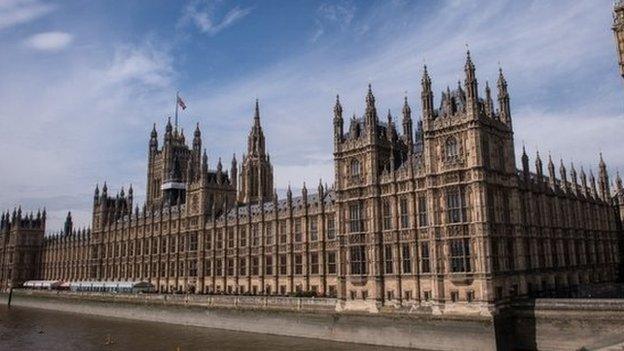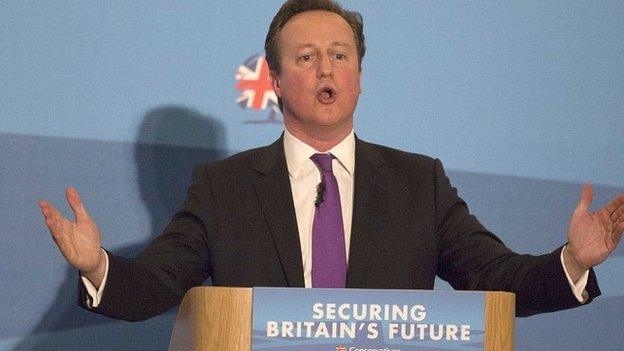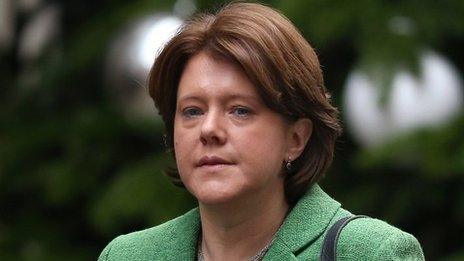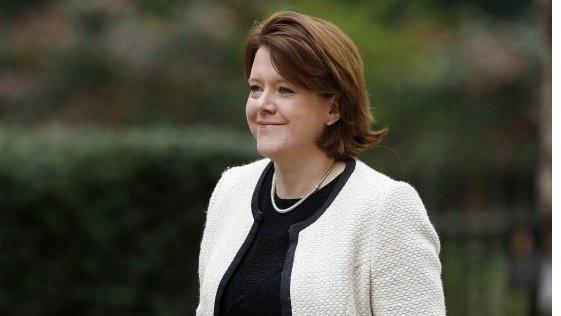Maria Miller expenses row: What led to her quitting?
- Published
Maria Miller: "I wish I could have stayed"
Maria Miller has resigned as culture secretary following a row over her parliamentary expenses, but what was the dispute all about?
Who is Maria Miller?
An LSE graduate and teenage Conservative activist who grew up and was educated in Bridgend, Maria Miller was elected as MP for Basingstoke in 2005 and rose to become one of the most senior women in the Conservative Party.
She became culture secretary in 2012 - one of four women in David Cameron's cabinet - having previously been a minister at the Department for Work and Pensions.
She was in a high-profile job, having been in charge of getting laws through Parliament to legalise same-sex marriage and to overhaul regulation of the newspaper industry in the wake of the phone-hacking scandal.

What was she accused of?
In December 2012, the Daily Telegraph published a story suggesting that Mrs Miller had claimed £90,718 in expenses over a four-year period towards mortgage payments on a house in south London that she shared with her husband, her children and her parents.
The newspaper said this appeared to be a breach of the rules on parliamentary allowances in force before 2010, which allowed MPs to claim back mortgage interest and other costs associated with having a second home.
Questions subsequently arose about whether Mrs Miller - who funded the purchase of her home with an offset mortgage - had failed to reduce her mortgage claims as interest rates fell.

MPs were banned from claiming mortgage interest on second homes in 2010

Was this investigated?
Yes. Following a complaint by the Labour MP John Mann, the parliamentary commissioner for standards starting investigating the case in 2013.
In her report, Kathryn Hudson cleared the MP of making false expenses claims and said her parents had not benefited financially from the arrangements in relation to her second home.
But she concluded that Mrs Miller over-claimed by £45,000 for expenses towards mortgage interest payments and council tax on the family home in London on the basis of the rules that were in place at the time.
She recommended that the MP should repay this precise sum.

So, did that happen?
No.
According to parliamentary rules, the commissioner can only make recommendations on such complaints.
The final say over what sanctions an MP should face is left to a committee of fellow MPs and lay members - the Commons Committee for Standards. The 10 MPs have a vote; the three lay members do not.
When they considered the matter, they decided Mrs Miller only needed to pay back £5,800 to cover over-claiming of mortgage expenses.
The discrepancy sprung from the difference between the size of Mrs Miller's mortgage, which was £525,000 when she entered the Commons in 2005, and the £237,500 purchase price of the five-bedroom property.
The commissioner believed she should only have been able to claim expenses for interest payments on the original 1996 mortgage of £215,000 and additional claims were outside the rules.
The committee disagreed and said the claims should extend to additions to the mortgage. However, it also said Mrs Miller should apologise to the House of Commons because her "attitude" to the commissioner's inquiry had breached the parliamentary code of conduct.

How did Mrs Miller react?
Maria Miller: "I fully accept the recommendations of the committee and thank them for bringing this matter to an end"
Maria Miller said she "fully" accepted the committee's recommendations and apologised "unreservedly" to Parliament.
However, the length and manner of her 32-second apology was criticised by many newspapers.
They suggested it did not reflect the critical tone of the commissioner's report and she had been let off lightly compared to other MPs - who had had to repay much larger sums in the wake of the 2009 expenses scandal.
They also focused on aspects of the commissioner's report which suggested the MP had challenged the parameters of the investigation and raised the lack of supporting and documentary information provided.

Why did newspapers feel so strongly?

Pressure from the press for Mrs Miller to stand down from her role has intensified
The former editor of the Daily Telegraph has acknowledged that the press may not be seen as impartial observers, given their resistance to the new system of press regulation backed by the government following the phone-hacking scandal and subsequent Leveson Inquiry.
Tony Gallagher has admitted the press "do have a dog in the fight" regarding Mrs Miller's expenses but has denied waging a vendetta against her.
Former Telegraph editor Tony Gallagher: 'Miller's resignation unavoidable'
However, he raised the bar by accusing Mrs Miller's special adviser and a close aide to David Cameron of trying to warn journalists off the original story in 2012 by raising the spectre of tougher press regulation.
The paper subsequently published the details of a phone call between its reporter Holly Watt and Jo Hindley, Mrs Miller's special adviser, in an effort to back up its claims that it had been "menaced".
Craig Oliver, the No 10 director of communications, has strongly denied threatening the paper, saying he contacted them to relay Mrs Miller's concerns about the paper approaching her elderly father.

Why did Maria Miller go?

The prime minister continued to support Maria Miller
While David Cameron continued to back Mrs Miller, one of his loyal supporters, pressure for her to go built up within the Conservative Party.
Former chairman Lord Tebbit was the first senior figure to suggest resignation, but others questioned the impact she was having on the party, just over a month before the European Parliament elections.
Mrs Miller made a last-ditch attempt to save her cabinet career on Tuesday, with her parliamentary aide Mary Macleod taking to the airwaves to say there was a press "witch-hunt" against her. The culture secretary wrote in her local newspaper that she was "devastated" to have "let down" her constituents.
But this failed to change the mood, with former House of Commons Speaker Baroness Boothroyd saying she should resign as a matter of "honour".
With the pressure from the media continuing and even growing, Mrs Miller decided to quit, saying the controversy had become a distraction for the government.
In his blog, Channel 4 News' Gary Gibbon, external says she was "discreetly pushed" by Downing Street, with "someone close to the prime minister" visiting to tell her the "game was up". But Mrs Miller insisted in a TV interview that it had been her own decision to go.
Mr Cameron is certain to have come under pressure over her position at prime minister's questions on Wednesday.
In his response to her resignation letter, the prime minister said he hoped she would return to government "in due course".
- Published6 April 2014

- Published9 April 2014
